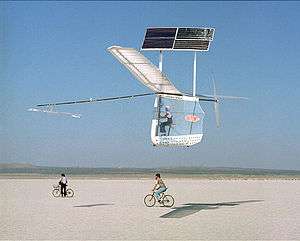MacCready Gossamer Penguin
| Gossamer Penguin | |
|---|---|
 | |
| Test flight of the Gossamer Penguin | |
| Role | experimental aircraft |
| National origin | United States |
| Manufacturer | AeroVironment |
| Designer | Paul MacCready |
| First flight | 1979 |
| Number built | 1 |
| Developed from | Gossamer Albatross |
| Developed into | Solar Challenger |
The Gossamer Penguin was a solar-powered experimental aircraft created by Paul MacCready's AeroVironment.[1]
The Penguin was a 3/4 scale version of the Gossamer Albatross II, and had a 71 ft.(21.64 meter) wingspan and a weight, without pilot, of 68 lb (31 kg). The powerplant was an AstroFlight Astro-40 electric motor, driven by a 541 watt solar panel consisting of 3920 solar cells.[2]
Initial test flights were performed using a 28 cell NiCad battery pack instead of a panel. The test pilot for these flights was MacCready's 13-year-old son Marshall, who weighed 80 lb (36 kg).
The official pilot for the project was Janice Brown, a charter pilot with commercial, instrument, and glider ratings who weighed slightly less than 100 lb (45 kg). She flew the Penguin approximately 40 times before a 1.95 mi (3.14 km) public demonstration at NASA's Dryden Flight Research Center on August 7, 1980.[3]
Specifications
Data from [1]
General characteristics
- Crew: 1
- Wingspan: 71 ft 0 in (21.64 m)
- Wing area: 297 sq ft (27.6 m2)
- Empty weight: 68 lb (30.8 kg)
- Fuel capacity: 28 x D type Nickel Cadmium (NiCad) cells or 3920 solar cells
- Powerplant: 1 × Astro-Flight Astro-40 double brush DC electric motor with 133:1 reduction
Performance
See also
- Related development
References
- 1 2 P.B. Macready; P.B.S. Lissaman; W.R. Morgan; J.D. Burke (June 1983). "Sun-Powered Aircraft Designs". Journal of Aircraft. 20: 487–493. doi:10.2514/3.44898. ISSN 0021-8669. Retrieved 2 February 2015.
- ↑ Boucher, Robert, J. (June 11–13, 1984). History of Solar Flight (AIAA-84-1429). 20th Joint Propulsion Conference, Cincinnati, Ohio: American Institute of Aeronautics and Astronautics. Retrieved 2 February 2015.
- ↑ Solar-powered Gossamer Penguin in flight, USA: NASA.
External links
![]() Media related to Gossamer Penguin at Wikimedia Commons
Media related to Gossamer Penguin at Wikimedia Commons
